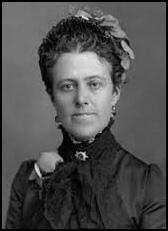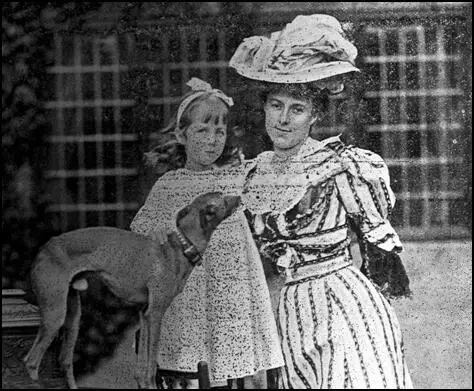Muriel de la Warr

Muriel Brassey, the daughter of Thomas Brassey, 1st Earl of Brassey (1836-1918), Lord of the Admiralty, was born in 1873. Muriel's grandfather was Thomas Brassey (1805-1870), the successful railway contractor.
Muriel Brassey married Gilbert Sackville, 8th Earl De La Warr (1869-1915) on 4th August 1891. Muriel gave birth to Idina (1893), Avice (1897) and Herbrand (1900).
According to The East Grinstead Observer: "Lord De La Warr left England for South Africa in October, 1899, returning in the following July. Since his return the relations between him and his wife had entirely changed owing to the conduct of the husband, and the family circle became very unhappy. In June 1901, the Earl withdrew from the family home and has never been back since." The marriage was dissolved in 1902 on the grounds of Gilbert's adultery with an actress.
Muriel, Countess De La Warr, was an active supporter of the Liberal Party but joined the Labour Party during the struggle for women's suffrage. The Countess De La Warr and her daughter Idina Sackville were both founder members of the East Grinstead Suffrage Union. So also was the Countess De La Warr's younger sister, Helen Brassey.

Muriel was originally a supporter of the Women's Social and Political Union. However, she broke with the WSPU during its arson campaign. In April 1912, the National Union of Women's Suffrage Societies announced that it intended to support Labour Party candidates in parliamentary by-elections. The NUWSS established an Election Fighting Fund (EFF) to support these Labour candidates. The EFF Committee, which administered the fund, included Muriel de la Warr, Margaret Ashton, Henry N. Brailsford, Kathleen Courtney, Millicent Fawcett, Catherine Marshall, Isabella Ford, Laurence Housman, Margory Lees and Ethel Annakin Snowden.
In 1913 Muriel de la Warr became president of of the East Grinstead Women's Suffrage Society. The following year she joined the United Suffragists. During this period she lived with Mary Dodge, the heiress to the automobile millions. They were also both members of The Theosophical Society.
A close friend, George Lansbury, later claimed that De La Warr played a very important role in the feminist and socialist movement but it was "little known, because she always insisted on being kept in the background". Lansbury pointed out that her money helped to support many campaigns such as the fights for women's suffrage, trade union rights and self-determination for India. Lansbury argues that without De La Warr's financial contributions the Daily Herald would have been forced to close.
Muriel's son, Herbrand Sackville, 9th Earl De La Warr (1900-1976) was the first hereditary peer to take his seat in the House of Lords as a supporter of the Labour Party. He was later to become one of Britain's youngest ever cabinet ministers.
Muriel Sackville, Countess De La Warr, died on 8th August 1930.
Primary Sources
(1) George Lansbury, Looking Backwards and Forwards (1935)
Of all the women, outside those belonging to my family and the working classes, whom I have known and worked with, none stands higher in my memory and esteem than Muriel, Countess De La Warr. I never heard her make a speech, though she must have attended hundreds of public meetings and many private gatherings of committees.
Whatever the cause I found her a keen, determined supporter of universal suffrage, an out-and-out supporter of self-determination for India and other races subject to British rule, a sound socialist in economics, and a most ardent supporter of all organisations for the defence of the defenceless, especially animals.
When in 1911-12 the London dock workers were on strike, and indeed whenever any great or small body of workers were suffering, she would raise money and hand it on anonymously, sometimes through myself and sometimes through others, to help the workers win. Over and over again she and her friends saved the Daily Herald from death in the old days when it was independent, and often it was her example and her work which helped women suffragists to hold on in the darkest days of defeat.
Her love for human rights and duties kept her very largely out of society. She spent her days almost secretly doing good. Many, many people like myself owe her a big debt of gratitude for the continuous help she gave to causes in which we worked.
(2) The East Grinstead Observer (22nd March, 1902)
A. Lyttleton appeared on the part of Lady De La Warr, said the parties were married on the 4th August 1891, and there were three three children of the marriage. Lord De La Warr left England for South Africa in October, 1899, returning in the following July. Since his return the relations between him and his wife had entirely changed owing to the conduct of the husband, and the family circle became very unhappy. In June 1901, the Earl withdrew from the family home and has never been back since.
(3) The East Grinstead Observer (22nd July, 1902)
Muriel Agnes Countess De La Warr of the Manor House, Bexhill, was granted a degree nissi in the Divorce Court on Friday on the grounds of misconduct and desertion of her husband, Gilbert De La Warr with Miss Turner, an actress. Miss Turner stated she met Lord De La Warr in December 1900 when she was acting in Bexhill. The same month she returned to London and took a room at the Savoy. Lord De La Warr stayed at the hotel with her, and subsequently visited her at her rooms in Tavistock Chambers.
(4) The East Grinstead Observer (14th October, 1911)
On 6th October a well attended meeting arranged by the East Grinstead Women's Suffrage Society was held at Queens Hall on Friday evening with the President, Muriel Countess De La Warr. She was supported by Eveline Haverfield and Margery Corbett.
(5) George Lansbury, The Miracle of Fleet Street (1925)
Muriel Countess de la Warr also sent a subslantial sum (to the Daily Herald), and has always been one of the first and most generous of our friends; there has never been a crisis overcome without her help. She is one of the few titled women in our land who for years past has sleadily supported our Movement; and not only the Labour cause, but other unpopular rnovements - the Irish and Indian demand for Home Rule, Women's Suffurage, and the great cause of Pacifism. Her son, Earl de la Warr, was a member of the first Labour Government. If he serves the Cause as wholeheartedly as his mother has served all good causes, Labour in him will have secured one of its finest recruits.
(6) The East Grinstead Observer (8th September, 1912)
Lady Helen Brassey and Lady Idina Sackville were the hostesses. Mrs. Uniacke said that surely no one can be satisfied with the world around us today. A great deal wants doing. Women want the right to influence public morals. They understand the difficulty of rearing children with healthy minds and bodies. Men now decide at what trades women shall work. Why cannot women decide?

